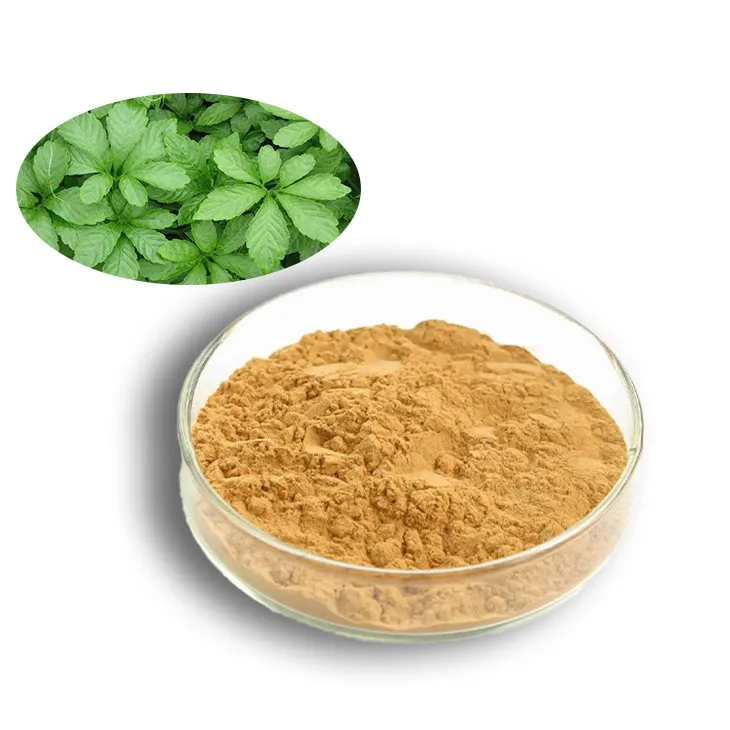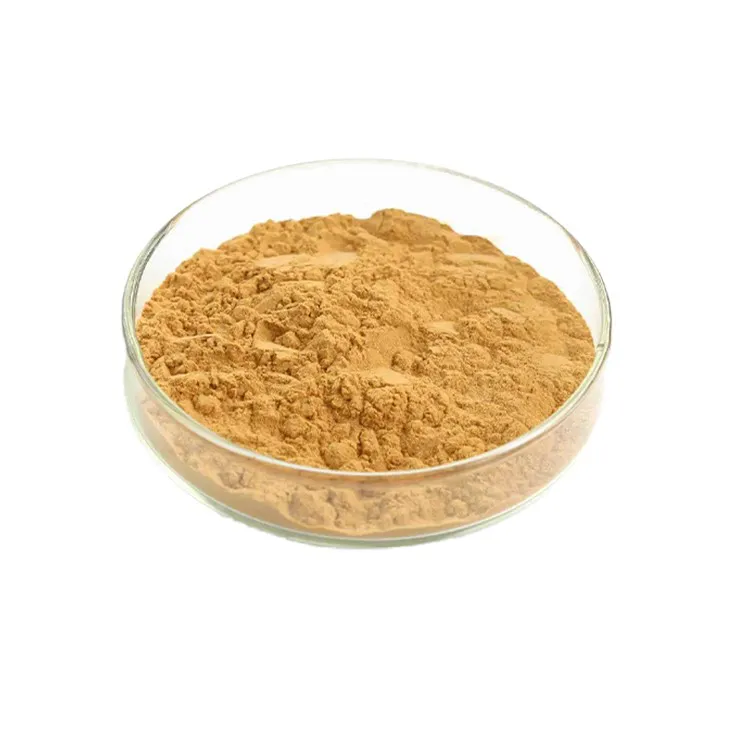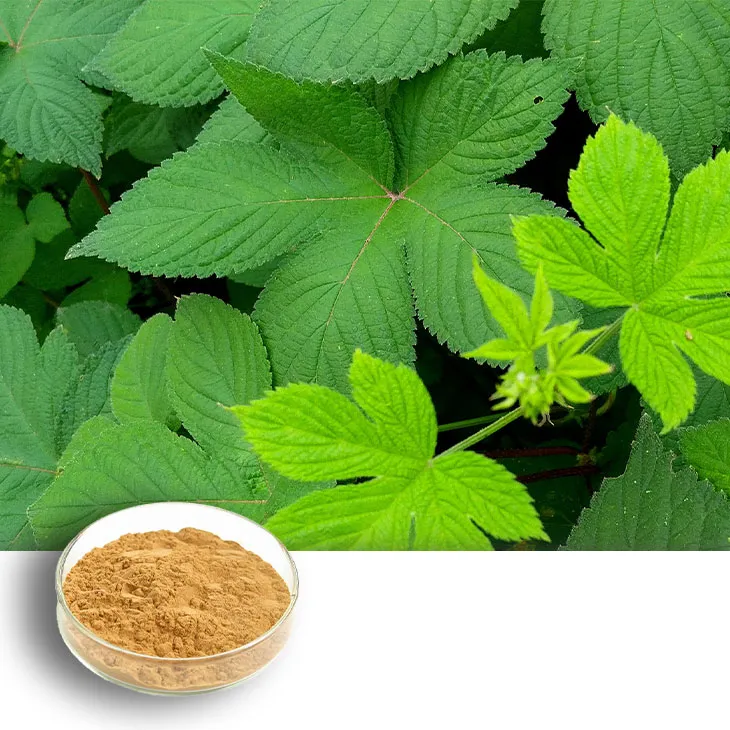- 0086-571-85302990
- sales@greenskybio.com
What is Gynostemma pentaphyllum extract? Definition, types, history and nutritional value.
2024-12-17

1. Definition
Gynostemma pentaphyllum extract is a substance derived from the Gynostemma pentaphyllum plant. This plant, also known as "Jiaogulan" in Chinese, is a climbing vine that belongs to the Cucurbitaceae family. The extract is obtained through various extraction methods, which are designed to isolate and concentrate the bioactive compounds present in the plant. These bioactive compounds are what give the extract its potential health - promoting properties.

2. Types
2.1 Crude Extracts
Crude Gynostemma pentaphyllum extracts are the initial form of the extract obtained from the plant. They are relatively unprocessed and contain a wide range of compounds found in the original plant material. These crude extracts may include not only the active saponins but also other plant - based substances such as polysaccharides, flavonoids, and various minerals. The extraction process for crude extracts typically involves simple solvent extraction methods, such as using water or ethanol to dissolve out the soluble components from the dried plant parts.
2.2 Refined Extracts
Refined Gynostemma pentaphyllum extracts, on the other hand, undergo further processing to purify and concentrate specific bioactive compounds, especially the saponins. This is often achieved through more advanced separation and purification techniques. For example, chromatography methods can be used to separate different saponin components based on their chemical properties. Refined extracts are usually more standardized in terms of the content of the active ingredients, making them more suitable for use in specific medical or health - promoting applications.

3. History
The use of Gynostemma pentaphyllum in traditional medicine has a long - standing history, especially in Asia.
3.1 Traditional Use in China
In China, Gynostemma pentaphyllum has been used for centuries in traditional Chinese medicine (TCM). It was initially regarded as a "folk medicine" in certain regions. TCM practitioners used it to treat a variety of ailments, including inflammation, digestive problems, and to enhance overall vitality. Ancient medical texts may not have as comprehensive records as modern research, but the oral traditions and scattered written records indicate its long - term use in the Chinese medical system.
3.2 Use in Other Asian Countries
Beyond China, Gynostemma pentaphyllum has also been used in other Asian countries. In Japan and Korea, for example, there has been an interest in this plant for its potential health benefits. Although the use may not be as deeply rooted as in China in terms of traditional medicine, the plant has gradually gained attention in recent decades with the growth of interest in natural remedies and traditional Asian medicine systems.

4. Nutritional Value
Gynostemma pentaphyllum extract is rich in various nutrients and bioactive compounds, which contribute to its nutritional value.
4.1 Saponins
The saponin content in Gynostemma pentaphyllum extract is particularly remarkable. Saponins are a type of glycoside compound that has a wide range of biological activities. These saponins play a crucial role in helping to regulate blood lipid levels. They can potentially lower the levels of harmful cholesterol (LDL - cholesterol) and triglycerides in the blood, while maintaining or even increasing the levels of beneficial cholesterol (HDL - cholesterol). This lipid - regulating effect can contribute to reducing the risk of cardiovascular diseases, such as heart attacks and strokes.
4.2 Amino Acids
The extract also contains amino acids that are essential for the human body. Amino acids are the building blocks of proteins, and they are necessary for various physiological functions. Some of the amino acids in Gynostemma pentaphyllum extract are involved in the synthesis of enzymes, hormones, and antibodies. They also play important roles in tissue repair, muscle building, and maintaining a healthy immune system. For example, lysine is important for collagen formation, and methionine is involved in the methylation process in the body.
4.3 Vitamins
Gynostemma pentaphyllum extract contains vitamins that are beneficial for overall health. These vitamins contribute to different aspects of the body's normal functioning, such as maintaining good vision (vitamin A), promoting skin health (vitamin E), and participating in energy metabolism (B - vitamins). Although the exact vitamin composition may vary depending on the extraction method and plant source, the presence of these vitamins adds to the overall nutritional value of the extract.
4.4 Other Compounds
In addition to saponins, amino acids, and vitamins, Gynostemma pentaphyllum extract may also contain other bioactive compounds such as flavonoids and polysaccharides. Flavonoids are known for their antioxidant properties, which can help protect the body against oxidative stress caused by free radicals. Polysaccharides, on the other hand, may have immunomodulatory effects, enhancing the body's immune response.

5. Conclusion
In conclusion, Gynostemma pentaphyllum extract is a valuable natural product with diverse types, a long - standing history of use, and rich nutritional value. The different types of extracts, including crude and refined forms, offer various options for different applications. Its historical use in Asian traditional medicine provides a basis for further research and exploration of its potential health benefits. The presence of saponins, amino acids, vitamins, and other bioactive compounds makes it a promising candidate for promoting health in various aspects, such as cardiovascular health, immune function, and overall well - being. However, more research is still needed to fully understand and optimize its use in modern medicine and health - promoting products.
FAQ:
What is Gynostemma pentaphyllum?
Gynostemma pentaphyllum is a plant. It has been used in traditional medicine in Asia for a long time.
How is Gynostemma pentaphyllum extract obtained?
The extract is obtained from the Gynostemma pentaphyllum through certain extraction processes, which can be divided into obtaining crude extracts and then further refining them into refined extracts.
What are the main types of Gynostemma pentaphyllum extract?
The main types are crude extracts and refined extracts. Crude extracts are the initial products of extraction, and refined extracts are further processed from crude extracts to be more pure and concentrated.
What is the significance of saponins in Gynostemma pentaphyllum extract?
The saponin content in Gynostemma pentaphyllum extract is notable. Saponins can help regulate blood lipid levels, which is beneficial for maintaining good health.
What essential amino acids are there in Gynostemma pentaphyllum extract?
It contains amino acids that are essential for the human body. These amino acids play important roles in maintaining normal physiological functions, but specific types of essential amino acids may require further in - depth research.
Related literature
- Gynostemma pentaphyllum: A Review of Its Phytochemistry, Pharmacology, and Clinical Applications"
- "Nutritional and Therapeutic Values of Gynostemma pentaphyllum"
- ▶ Hesperidin
- ▶ citrus bioflavonoids
- ▶ plant extract
- ▶ lycopene
- ▶ Diosmin
- ▶ Grape seed extract
- ▶ Sea buckthorn Juice Powder
- ▶ Beetroot powder
- ▶ Hops Extract
- ▶ Artichoke Extract
- ▶ Reishi mushroom extract
- ▶ Astaxanthin
- ▶ Green Tea Extract
- ▶ Curcumin Extract
- ▶ Horse Chestnut Extract
- ▶ Other Problems
- ▶ Boswellia Serrata Extract
- ▶ Resveratrol Extract
- ▶ Marigold Extract
- ▶ Grape Leaf Extract
- ▶ blog3
- ▶ blog4
- ▶ blog5
-
Selenium yeast
2024-12-17
-
Bilberry Extract
2024-12-17
-
Polygonum Cuspidatum Extract
2024-12-17
-
Golden Seal Extract
2024-12-17
-
Eucommia Ulmoides Extract
2024-12-17
-
Peppermint Oil
2024-12-17
-
Andrographis Paniculata Extract Powder
2024-12-17
-
Alisma Extract
2024-12-17
-
Ginger Extract
2024-12-17
-
Calendula Extract
2024-12-17





















